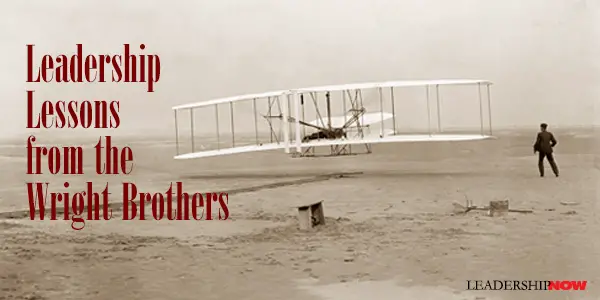Leadership Lessons from the Wright Brothers

THE WRIGHT BROTHERS were born into an exciting period of American history. A time of great progress. Life-changing progress.
It was their character that served them well in pursuing their passion for manned flight. The genius of the Wright brothers wasn’t just that they invented a plane. It is that they figured out how to control it—how to fly it. David McCullough captures this well in one of the best leadership books of 2015. The quotes in this post are from his book, The Wright Brothers.
Their story provides us with many lessons for leaders. It’s a story of the possibilities that show themselves when we approach life from the right perspective.
Courage
Their mission was exciting but it was dangerous. They were putting their lives at risk. “But the brothers, ever conscious of the risks involved, had already decided they must never fly together. That way, if one were to be killed, the other could still carry on the work.”
Determination
Their courage was driven by their belief and confidence in what they were doing. They knew how to deal with failure. Failure informed the process and thus spurred them on. Impossible problems are solved with hard work and attention to detail. In the beginning, they got little support from others. They were ridiculed by neighbors and the establishment in Washington D.C. Their time at Kitty Hawk was physically challenging as they dealt with the elements—the mosquitoes, the heat, the winds—but they persisted. They were highly-disciplined and focused. They were motivated by their work and found joy in it. Thus they were able to keep a proper perspective on either external criticisms or adulation.
Life-Long Learning
Although neither brother went to college or even finished high school, they were well educated. Their father, Bishop Wright, who was an itinerant minister, kept the house well stocked with books. He “heartily championed the limitless value of reading,” and insisted that the children learn to use the English language properly. “He was never overly concerned about his children’s attendance at school. If one or the other of them chose to miss a day or two for some project or interest he thought worthy, it was all right. And certainly, he ranked reading as worthy.” It was a book from their family library, Animal Mechanism, that sparked Wilbur’s interest in “aerial locomotion.” Reading fueled their curiosity about nearly everything—Wilbur especially so. They never stopped learning.
Communication
The brother knew how to communicate their ideas clearly and effectively. Because of how they were brought up, their command of the English language was impressive. Wilbur was “an exceptional public speaker and lucid writer.” When he spoke in public, “his remarks were invariably articulate, to the point, and quite memorable.” “His vocabulary and use of language were of the highest order, due in large measure to standards long insisted upon by his father.”
Teamwork
The brothers worked well together and played to each other’s strengths. They understood each other. “Not that things always went smoothly. They could be highly demanding and critical of each other, disagree to the point of shouting ‘something terrible.’ At times, after an hour or more of heated argument, they would find themselves as far from agreement as when they started, except that each had changed to the other’s original position.” It was their way of working out the solutions to the problems they faced.
Character
It was their character that tied all of their strengths together. French aviator Léon Delagrange wrote, “Wilber Wright is the best example of strength of character that I have ever seen. In spite of the sarcastic remarks and the mockery, in spite of the traps set up from everywhere all these years, he has not faltered.” Their character shaped their attitude and approach to life. And it was formed in the home by their father. Describing Bishop Wright, McCullough writes: “From wide reading and observations of life, he had acquired what seemed an inexhaustible supply of advice on behavior, habits good and bad, things to be aware of in life, goals to strive for. He lectured on dress, cleanliness, economy. At home, he preached courage and good character—‘good mettle,’ as he would say—worthy purpose and perseverance. Providing guidelines he understood to be part of a father’s duty.”
* * *

Like us on
Instagram and
Facebook for additional leadership and personal development ideas.
* * *

Posted by Michael McKinney at 08:49 PM
Permalink
| Comments (0)
| This post is about Leaders










